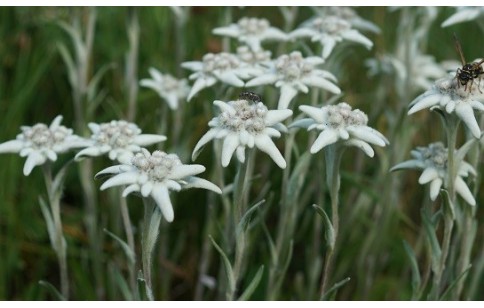- Code : #1102 S 20 mg
- Formula : C₁₅H₁₀O₅
- CAS : 520-36-5
Leontopodium alpinum
Leontopodium alpinum, « Edelweiss » both in English and French belongs to the Asteraceae botanical family.
Native to south-east and south-central Europe, this small herb (0.2 m) grows in alpine meadows on rocky and grassy slopes at altitudes from 220 to 3140 m.
In European/alpine folk medicine, extracts of its flowers were used for the treatment of abdominal aches, angina, bronchitis, cancer, diarrhea, dysentery, and fever for humans as well as for live-stock. The whole plant is said to be astringent and antitussive and was used against tumor diseases in Polish traditional medicine.
Research shows that its roots and aerial parts exhibit pronounced anti-inflammatory activity.
It contains more than fifty secondary metabolites, among which some (sesquiterpenes, coumarin, linolic and linolenic acids etc) have a high antimicrobial activity that supports the use of this plant for the treatment of abdominal aches, diarrhea, and dysentery. Its phenylpropanoids (dicaffeoyl-quinic acids, leontopodic acids) are also claimed as cosmetic actives.

- Code : #1004 S 20 mg
- Formula : C₂₁H₂₀O₁₀
- CAS : 578-74-5
- Code : #1104 S 5 mg
- Formula : C₁₆H₁₂O₆
- CAS : 491-71-4
- Code : #4946 S 10 mg
- Formula : C₂₅H₂₄O₁₂
- CAS : 2450-53-5
- Code : #6032 S 5 mg
- Formula : C₃₇H₃₄O₁₉
- CAS : 853997-31-6
- Code : #6027 5 mg
- Formula : C₃₃H₂₈O₁₇
- CAS : 933063-22-0
- Code : #1125 S 20 mg
- Formula : C₁₅H₁₀O₆
- CAS : 491-70-3
- Code : #1412 S 10 mg
- Formula : C₂₁H₂₀O₁₁
- CAS : 6920-38-3
- Code : #1126 S 20 mg
- Formula : C₂₁H₂₀O₁₁
- CAS : 5373-11-5










